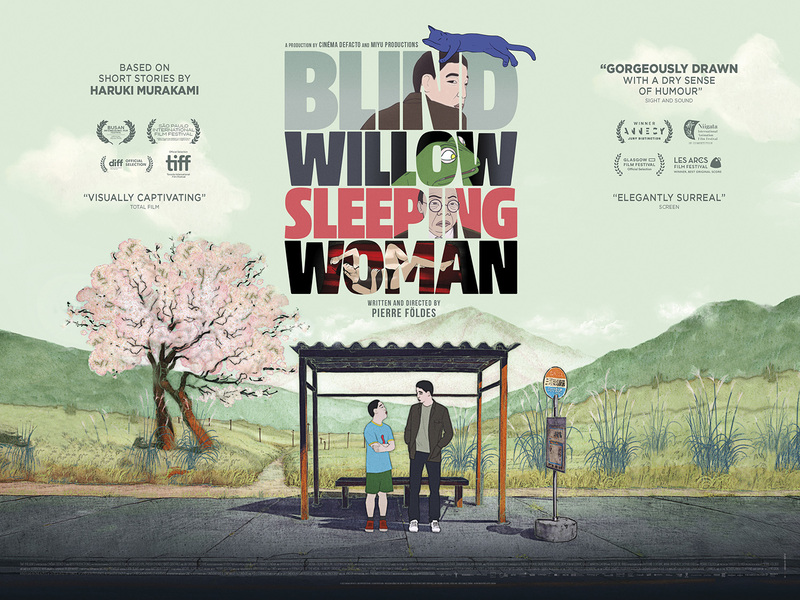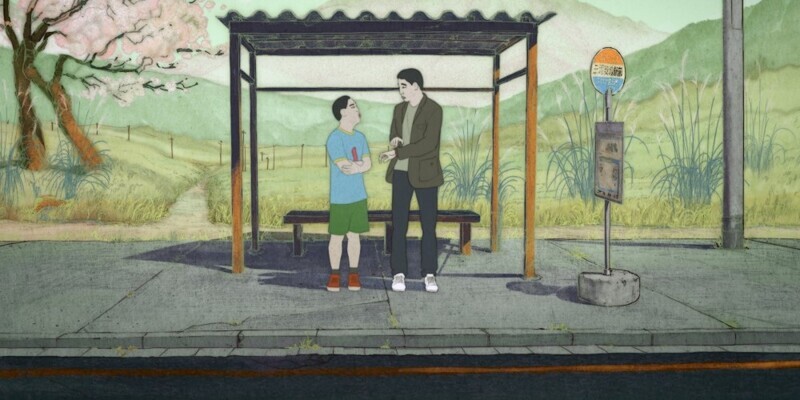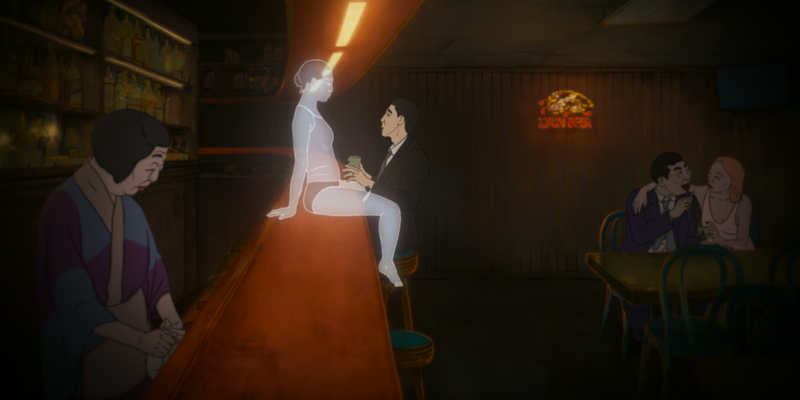
Review by
Benjamin Poole
Directed by: Pierre Földes
Voice Cast: Marcello Arroyo, Michael Czyz, Zag Dorison, Pierre Földes, Jesse Noah
Gruman, Katharine King So, John Vamvas, Nadia Verrucci, Shoshana
Wilder

An international co-production written, produced, directed and composed
by Pierre Földes in his feature debut,
Blind Willow, Sleeping Woman uses six
Haruki Murakami short stories (from across three different
collections) as its anthologised plot, blending the tales together in a
flickering pastel palette of love and loss.

The author's recurrent themes of trauma (both collective and personal),
spiritualism and sexuality abide, with
Blind Willow, Sleeping Woman's elegant animation suiting Murakami's magic realism inflected
narratives. Here, two male office workers share the primary plotlines:
the younger man is attempting to get over his wife's abandonment of him,
while his counterpart (the two are deliberately mirrored within the
film) is an older fella who is visited by a seven-foot frog. The talking
amphibian enlists him to help save Tokyo from a forthcoming earthquake.
Taking place in the aftermath of the Kobe disaster, the main characters
and their deuteragonists wander through their variegated narratives as
if shell shocked, a somnambulist dynamic which exemplifies Murakami's
predominant ideas surrounding sleepy visions and the waking dreams that
are stories.

In Blind Willow, Sleeping Woman's narrative hall of mirrors, characters recount memories or remember
stories, nudging the plot in different directions like blossoms soft
lifted by the shot breeze. With the expressive potentials of its
animated form, the kokeshi structure gives the film an intriguingly free
associative, almost psychedelic, feel. A broken relationship's sombre
ennui is surreally contrasted by vivid Kaiju visions of a massive worm
churning up the city, and a bright blue cat occasionally spectres the
screen while characters melt in and out of the frame: this is a world
without weight, existential and ephemeral.
The use of form is certainly effective, but your ultimate mileage may
vary depending on how much of Blind Willow, Sleeping Woman's "Murakami-ness" you can stomach. The author's abiding theme of
egoism proves to be the film's true narrative drive. Primarily
established in Junpei's navel gazing mope over his Mrs, and further
matched by Katagiri's possible mental breakdown brought on by latent
mid-life crises manifesting in absurd fantasies of heroism, this is the
stuff of modern masculine trauma (women are often diegetically presented
within the context of male fantasy, with Hokusai's Dream of the
Fisherman's Wife pointedly plonked in the background of one scene).
Junpei's absconded partner tells him he is "like chunk of air," which
really gets to him, and the mise-en-scene corresponds with background
characters having the negative space outlines of Cristina Troufa's
primary school sketches: being and nothingness, etc. Yet, within this
subjective framework you're never quite sure how much of
Blind Willow, Sleeping Woman's intent is to present its protagonists as pitiable or pitiful. Are
our boys suffering life's great challenges, or do they just need to get
over themselves?

A clue might yet be found in the propensity multiple characters have for
quoting Great Thinkers, with, among others, Hemingway's reference to
courage (honestly!) and Seneca's definition of choices being freely
cited. The film duly presents these bromides as perceptive wisdoms
crucial to narrative denouement, and not the sort of cliché you'd find
superimposed over the saturated image of an ocean on the Facebook feed
of your most basic follower. Maybe the glib quotations are less borrowed
profoundness than an indicator of the steadfast superficiality of the
characters, their frighteningly limited mind sets and situations, which
they attempt to escape via dream (the men) or flight/sex (the women). I
suspect not though, regarding the towering solipsism which defines
Murakami's work (and the artist himself? How do you know if someone is
training for a marathon?/Don’t worry, they’ll let you know, etc). Still,
with a sustained interest in cinematic adaptation of Murakami (this is
the seventh in a decade, following that
Drive My Car everyone made a fuss over a couple of years
ago), and in the same way that I as a Constant Reader eagerly await this
year's release of another Children of the Corn adaptation,
Blind Willow, Sleeping Woman will provide plenty to please
fans of the popular author.

Blind Willow, Sleeping Woman is
in UK/ROI cinemas from March 31st.

